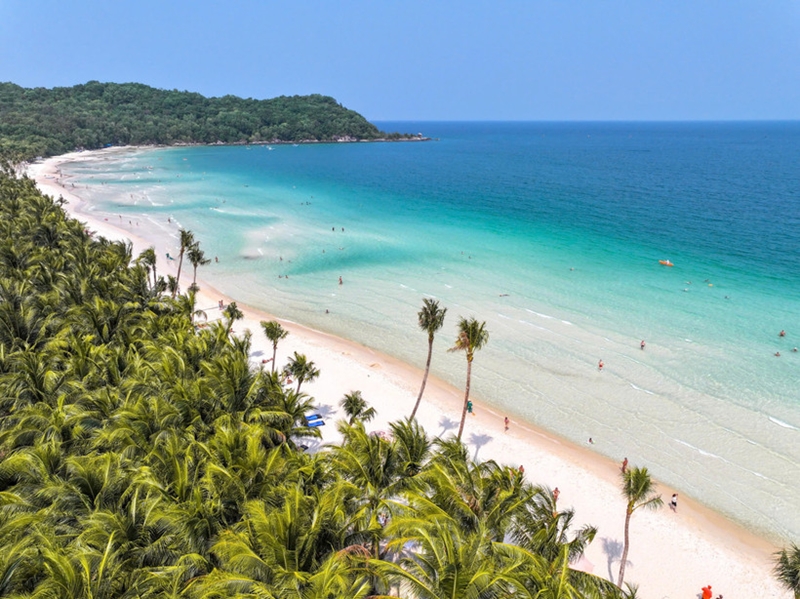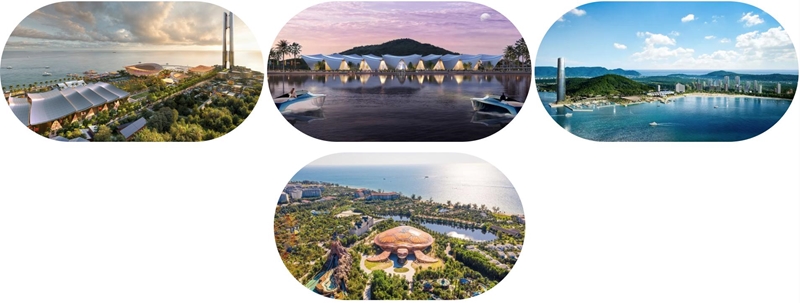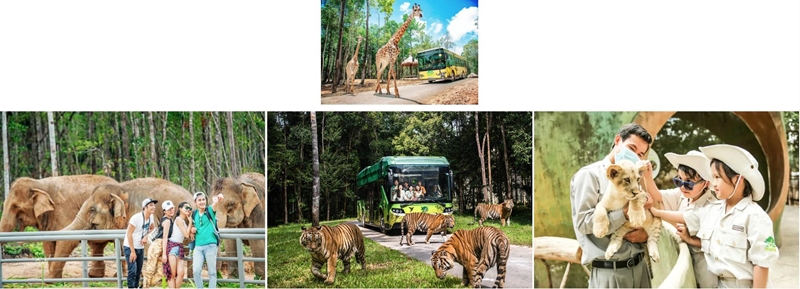Seizing a golden opportunity
Phu Quoc is cashing in on its unique advantages to propel forward. Its designation as the host of the Asia-Pacific Economic Cooperation (APEC) Economic Leaders’ Week in 2027 offers a golden ticket to revamp socio-economic infrastructure, court global investment, and supercharge tourism and services.
Local leaders plan to harness this rare chance by unlocking local potential, effectively pooling resources to advance economic growth, sci-tech, innovation, and digital transformation. Phu Quoc's target for the period from 2025 to 2030 is to become a smart city and a beacon of eco-tourism and marine resort excellence, recognized both globally and nationally.
    |
 |
|
Bai Kem in Phu Quoc is often described by visitors as "Paradise on Earth." (Photo: Fatel Belek) |
Tran Minh Khoa, Chairman of the Phu Quoc Special Zone People’s Committee, envisioned marine tourism, bolstered by tailored incentives, as a catalyst for growth not just for Phu Quoc but for the surrounding region. Phu Quoc aims to follow a growth path that is green, digital, and deeply integrated. The core drivers of this new growth model will be digital transformation, circular economy and blue economy.
Khoa suggested that APEC 2027 presents an opportunity to ignite national pride, promote self-reliance and resilience, and leverage cultural and human resources as engines of growth.
By 2030, Phu Quoc aims for an annual budget revenue growth of 6.68% and a yearly increase of 16.47% in tourist arrivals. Foreign visitors are expected to rise by 14.87%, while social investment capital is projected to reach 50 trillion VND (approximately 1.92 billion USD), growing at an annual rate of 18.39%. Additionally, the percentage of those living in poverty is expected to drop below 1%.
To bring this vision to reality, Phu Quoc has charted breakthroughs: developing a sustainable, smart, modern and livable special zone, boosting marine and service industries, particularly tourism, and beefing up human capital, with a focus on leadership and management training.
Digital transformation, smart government building, and sci-tech and innovation are also central, including plans for universal English-language training.
A multifaceted development plan
Khoa said Phu Quoc has developed a comprehensive set of tasks and solutions across various sectors to ensure sustainable growth. This plan focuses on economic development, advancements in science and technology, and environmental protection. The island is leveraging special mechanisms and policies from the Government to establish itself as a premium tourism and eco-service hub with both global and national significance.
    |
 |
|
Phu Quoc Aquarium in Kien Giang province |
Urban planning is transforming to develop a smart coastal tourism city as the economy pivots towards becoming a hub for commercial, financial, and banking sectors. Night-time and sharing economies are expected to thrive, with considerable support for startups. Tourism will be a leading industry, attracting substantial investment into luxury resorts and cultural and historical attractions. Marketing efforts are in full swing, and the workforce is leveling up with new training.
Complementary industries, including food and beverage processing, jewelry, souvenirs, and the traditional fish sauce sector, are being nurtured to complement the tourism boom. Plans are ready for renewable energy projects, such as waste-to-energy, wind, and solar, while sustainable agro-forestry-fisheries will fuel eco-tourism and high-tech organic farming.
The marine economy is a key focus, with Phu Quoc aiming to be an attractive sea-island urban hub for integrated eco-tourism. Over 40,000 hectares of marine reserves are under tight watch to keep them pristine.
Private sector investment will be a critical driver, supported by a transparent business environment, administrative reforms, and fewer roadblocks. Public funds will target major infrastructure, while external capital gets rolled out strategically. Sci-tech, innovation, and digital transformation will infiltrate all sectors, prioritizing marine economy, trade and services, tourism, health care, and education.
Phu Quoc is also doubling down on eco-protection, with plans for waste and wastewater cleanup to deliver a plastic-free coastline. Phu Quoc National Park and other reserves will see stricter conservation measures.
The island’s cultural heritage, including its century-old fish sauce trade, will be elevated as a draw for experiential tourism, with every resident envisioned as a “cultural ambassador.”
    |
 |
|
Tourists visit Vinpearl Safari Phu Quoc (Photo: VinWonders) |
Education is being reimagined with smart-school models and widespread foreign-language training, particularly in English, to equip key sectors for global engagement.
On the security front, Phu Quoc is fortifying its national defense and security to safeguard maritime sovereignty while expanding its global outreach. In preparation for APEC 2027, a campaign titled “Every Phu Quoc resident is a tourism ambassador” seeks to galvanize the community and political system alike.
Phu Quoc’s pursuit of recognition as a world-class special zone is not just a strategic development plan but also a bold aspiration to rise in the new era, cementing its position on the global tourism map and becoming an economic growth engine for An Giang province, the Mekong Delta, and Vietnam as a whole.
Source: VNA